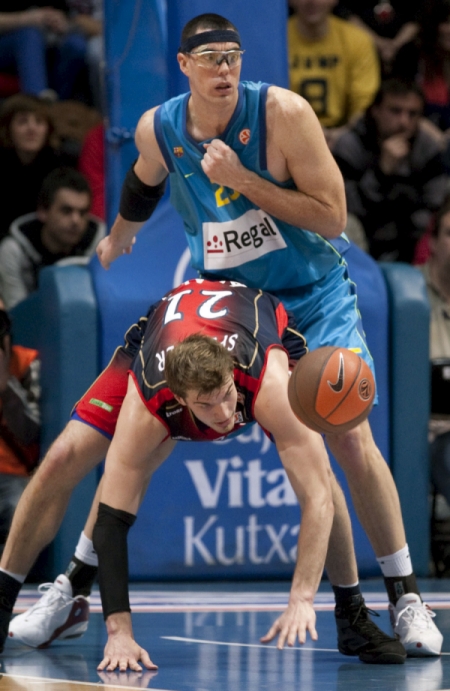
Maccabi: Something to cheer about. (Photo by Yaniv Ben Simon, MaccabiFans.co.il)
In the afterglow of Euroleague week four, BallinEurope’s man in Italy, Francesco Cappelletti, rounds up all that was in the week that was, including the lack of upsets, a dearth of home support in Turkey, and several teams that have yet to make the leap.
Easy groups
At the day of the Euroleague draw, most of us said Group C was the toughest, with four teams able to reach last Top 16 (Caja Laboral, Lottomatica Roma, CSKA Moscow, Maccabi Tel Aviv) and two representatives of the fighting Balkan-Greek spirit in Maroussi BC and Union Olimpija. Group D followed C, with a combination of newly ambitious squads (AJ Milano, Real Madrid), national champions (Asseco Prokom, EWE Baskets), and the dangerous Khimki Moscow and Panathinaikos to boot.
Now that four weeks are over, it’s right to say all those forecasts have gone south, because we have not seen a surprising upset since Euroleague tipped off. Big clubs lose games only against each other, and rarely have they left points in lower courts: Among the 48 matches played thus far, we are astonished only by Lietuvos Rytas’ win against Efes Pilsen in week 1. Maroussi grazed at an upset victory in its debut but Viktor Khryapa denied them; after this … nothing.
Smaller, less powerful teams prefer to face Panathinaikos & Co. openly, staying in the game for 20-25 minutes before turning things over to the bench. Consider Asvel, excellent for almost three periods against Montepaschi and Barcelona but ultimately at a disadvantage: Asvel was pushed around by Ali Traore and Mindaugas Lukauskis, and behind them Victor Samnick and Ben Dewar; Siena meanwhile could move Romain Sato to power forward and the Spaniards replaced Fran Vasquez with Terrence Morris. This is the old but always valid market rule; against superior financial condition, nothing can be done apart from using the mind in a better way.

What happened, Tiago?
As it stands, there’s no hope for Asvel-level teams to beat the elite. I think it’s time to return to the press, the trap and forcing turnovers, to studying more tactical and aggressive games which could accentuate the clear advantage of playing in tiny arenas.
Crisis in Istanbul
While Efes Pilsen is 1-3 in Group B and continues struggling defensively (103 points surrendered to Athens, and two weeks ago 93 to Malaga) but hopes to recover, thanks to the home-court advantage in upcoming games against Lietuvos Rytas, Unicaja and Olympiacos, the other part of Istanbul can’t equally shine. Euroleague warnings about attendance insufficient to meet Jordi Bertomeu’s demands (fewer than 1000 per game) are not the only problems with which Fenerbahçe Ülker must deal, for even in spite of huge investment, the team hasn’t succeeded in making the leap to the top of competition this season.
From several corners, many mutterings are rising, basically directed at Bogdan Tanjevic’s management. Even against the Ksistof Lavrinovic-devoid Montepaschi, Fenerbahçe showed the same lack of offensive ideas, a terrible sin for a roster full of so many solutions.
The now-waived Will Solomon was hardly the reason for that troublesome start (in the Turkish League, Efes Pilsen destroyed Fenerbahçe, 80-67): Now it’s time for Tanjevic to answer the charges. Fenerbahce has no defense, doesn’t exploit the unlimited resources it has in the paint, and most of its plays end with an isolation into which the ball moved little and badly.
This team has the makings of a playoff contender, but doesn’t resemble a traditional candidate (as do Khimki, Unicaja, and Maccabi currently) at all. Is it Tanjevic’s fault? At the moment, he’s evidently a better teacher than a coach. A work of great merit has made Oguz Savas a Euroleague-worthy player, but now he has to find the plan to make him (or Preldzic or Greer or Kinsey, whomever) productive within a system.
The next step
It seems there’re just four or five teams which can reasonably talk about making the Final Four. That’s why those expected to come out at the elite level: They haven’t made the final step yet.
Maccabi won in Rome but hasn’t showed the qualities of a top team (except from some interesting matchup defenses, including a physically strong 1-3-1 with Maciej Lampe running the baseline); Pini Gershon has to thank Nando Gentile for his insane choice of not fouling when ahead by three points with less than 0:09 to play. Andrew Wisniewski put the three in, and the result of overtime could be taken for granted, because Lottomatica is too small to go to the paint (Hutson and Toure bptj fouled out) and is sustained by Kennedy Winston’s outside show. For these reasons (not to mention the inexperienced coach), Rome has to wait for more than a Top 16 qualification.
Looking at the others, Sergio Scariolo hasn’t made his mark on Khimki, the team probably the most likely to bridge the gap, and the devolution of Timofey Mozgov is something worrying, considering his potential and the latest Eurocup-Eurobaskets played by the Russian.
Unicaja Malaga is 4-0 in Group B and has beaten Olympiacos and Efes Pilsen at home; but we’ll decide this team’s status when its ACB record is acceptable (they’re 1-5 at present) and Georgios Printezis’ loss is assimilated. As of Efes Pilsen and Fenerbahçe Istanbul, as stated above, they’re disappointing everyone and so a notch below.
Mumble mumble…
Worst exhibition ever for Tiago Splitter: seven points scored to go with four fouls committed in just 11 minutes against Maroussi … Ettore Messina didn’t want a replay of the first road game at Khimki: to dispel any inconvenience at Oldenburg, Real Madrid was up 58-38 at halftime and finished with an awesome 33/43 shooting from two points … Lietuvos Rytas’ Bojan Popovic was named Euroleague October MVP, but Matt Walsh deserves a mention. In losing effort after losing effort, Walsh has 24.5 points per game and a 26 index rating … In Orleans, Unicaja Malaga went on a 22-0 run in the second quarter that broke the game open, led by a flurry of three-pointers (16-of-32 at the buzzer) … Zelimir Obradovic believes in Giorgi Shermadini, demonstrated so by giving him about 10 minutes in every game. Up to now, the Georgian has been praiseworthy with 6.5 points per game and 73% shooting from two points – a solid part of the rotation until Mike Batiste and Kostas Tsartsaris return…




Leave a Reply